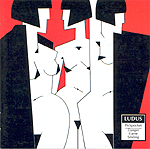Dancing On The Asylum Ceiling | |

| Some say there are golden eras in any art form. In terms of Rock and Pop I most often hear people talk about the late '60s and the late '70s, those eras that gave us the likes of Californian Soft Pop, Psychedelic Rock, proto-punks, disco and of course eventually Punk in all its various guises and with all its various spin-offs. For me though, it was what Punk morphed into as the '80s dawned that was, and remains, most intriguing and challenging. More than this, it's the twisted punk directions taken by the women of the time that seem to have stood up most impressively over anything else, that have etched a particularly vibrant slash on the history of (un)popular culture. Naturally it's there in the demonic dub threat and exuberant exultations made by the Slits. Obviously it's there in the wild abandon and tightly reigned angular dynamism of Essential Logic, Kleenex, LiLiPUT and Bush Tetras. It's even there in the darkest and most deliberately edgy Banshees moments. And clearly too it's there in the delicious staccato jazz-funk rhythms of Ludus. All obtuse angles and lines flying off at tangents, Ludus is surely the art and architecture of Malevich, Tatlin and Duchamp given voice. Not that many got to realise this back in the early '80s. One strange, fellow Mancunian loner got the picture of course, and went on to write a song about walking through the cemetery gates and among the gravestones with Ludus' singer Linder Sterling, but I'll leave it for others to make more of that. Not that Linder was simply a singer; she was also a visual artist who gave us a load of terrific imagery, not least on the sleeves of the Buzzcocks' 'Orgasm Addict', Magazine's Real Life and in the pages of Manchester's legendary 'Secret Public' fanzine. She also rather infamously once played the old used tampons on paper plates game at a Ludus show at the Hacienda, thereby horrifying Tony Wilson, apparently, but that's a story you can read about elsewhere. But it's the music of Ludus that most deserves respect and which most assuredly demands being rescued from the vaults. Thankfully then we have James Nice and his by now surely legendary LTM imprint, who earlier this year of course issued the essential Ludus compilation The Damage. Not content with simply releasing this sampler, however, LTM have now reissued a bunch of Ludus originals from the early '80s on a pair of gorgeous CDs. First off, there's the classic first Ludus EP, 1980's four track release on New Hormones. The Visit features amongst others the amazing 'I Can't Swim I Have Nightmares' which is full of the kinds of edgy funk guitars beloved of the likes of Fire Engines and Josef K married to staccato drumming and a great dub bass line. All of it punctuated by some warbling and wailing sax work by Ian Devine that marks him out as maybe some distant English cousin of James Chance. On top of all this there is Linder's voice, flying and falling in great Kandinsky arcs, staying just the right side of Diamanda Galas histrionics. Marvellous stuff. Then there's 1982's The Seduction. Originally released by New Hormones as a double 12" package, The Seduction is arguably Ludus' most cohesive statement, and possibly contains their most accessible Pop songs, notably in the last two tracks, the swinging 'Mirror Mirror' and 'The Escape Artist' which are like Weekend with rougher edges and sharper teeth. Which maybe isn't surprising, since Ian Devine later went on, post-Ludus, to work with Weekender Alison Statton as Statton and Devine. |

| The second CD contains two more New Hormones releases from 1982; the short sharp six track Pickpocket and the eighteen track Danger Came Smiling. Pickpocket is by far the more accessible of the two, and contains some tremendous Pop moments like openers 'Patient' and 'The Fool', both of which are supreme blasts of Pop Noise that dance on the ceiling of the asylum, flinging great ribbons of fluorescent light in spirals of abandon. With it's short (only the moody 'Hugo Blanco' is over four minutes long) length and insistence on a quirky Pop aesthetic, Pickpocket puts me in mind of Felt's greatest Pop albums Let The Snakes Crinkle Their Heads To Death and Forever Breathes The Lonely Word, although naturally the sound is all different. Well, maybe only a bit different. It just depends on how you happen to look at it. Danger Came Smiling is a much stranger beast, and is certainly much more challenging and wilfully experimental than anything previously attempted by Ludus. It's full of aggressively anti-polish Jazz, a conscious effort to take a stance against the plush dullness which was already starting to clutter up the UK charts at the time, and vocals that are mostly abstract, with Linder yelping, shrieking and squealing. At times it's great, like Public Image Limited, or early A Certain Ratio, all pared down dancehall noise for the outsiders. At other's it's simply rather annoying, like watching a personal exorcism (as Linder indeed described the album as being). And as with all voyeuristic things, such delights work best in short doses. Had Danger Came Smiling been restricted to a six track EP I think I'd have been much happier. It's a trifling criticism though, and I'm sure that there are many out there who will much prefer the avant garde-isms of Danger Came Smiling to the more obviously Pop constructs of Pickpocket or The Visit. And naturally the concept of 'obviously' is relative.... Housed in original Linder artwork and featuring extensive and excellently written sleeve-notes by James Nice, these two CDs are more proof, if ever it was needed, that those early '80s times were indeed a golden era for culture where adventurous souls strove to rewrite the rules of Pop and Rock. You'd be crazy to miss out. © 2002 Alistair Fitchett |